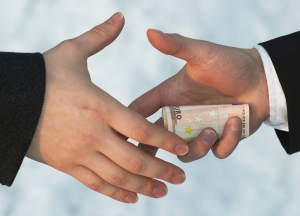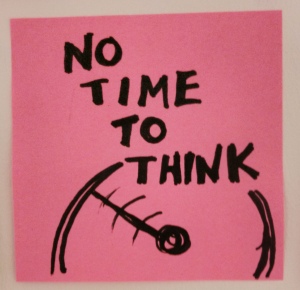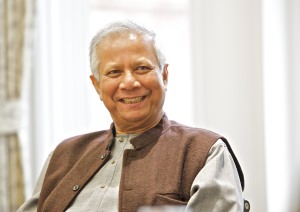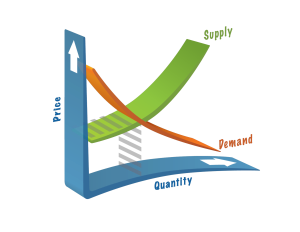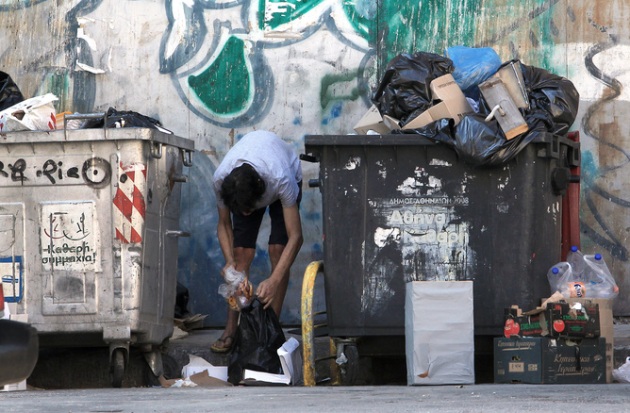
The situation that has developed in Greece is a fascinating example of how commercial contracts, and within that MONEY, oftentimes (EVERY TIME?) takes precedence over Human Rights, even though international laws dictates that it should be the other way around. In this article I will expand on the possibilities that exist within international law to repudiate and cancel debt contracts when these makes it difficult for the debtor to fulfill its Human Rights obligations.
For starters, lets recap on the situation in Greece. What has happened is that the country, for various reasons, has accumulated a substantial amount of debt. Greece was close to defaulting on its outstanding debt and many private creditors were exposed to great risk. That is when the European Central Bank, the IMF and the European Union, otherwise known as the Troika, decided to step in. The Greece government apparently received bailout funds to handle their debts, however, these monies were only used to bailout the private creditors and transfer the risk of the debt to the Troika. As such, what happened was that the bonds switched owners – and much private debt was transformed into public debt; the winners being the private creditors, aka banks, and the losers being, the public.
For Greece to be eligible to the alleged ‘rescue packages’ it had to agree to implement structural adjustment programs, and within that enforce measures of austerity. In a less refined language, we would call that, forcibly living in dirt poor conditions to save up money, to pay of the pissed of creditor, otherwise he will hurt you. And these agreements were signed in 2010 and 2011 respectively, and in 2013, the Human Rights Council evaluated the conditions of Greece and how the adjustment programs had affected the people of Greece [1]. And then in 2015, we have a report submitted by the Truth Committee on Public Debt, a committee created by the Greece Hellenic Parliament with the purpose of investigating the debt of Greece [2]. Both these papers tell a similar story, that Greece is in the midst of a humanitarian crisis – and the reason – paying back debt. Does this make any sense?
It is no exaggeration to say that the situation in Greece has gotten completely out of hands, literally speaking, and that there has been substantial damages made to the economical and social fabric of the nation. Peoples access to housing, health, nutrition, education, freedom of expression and assembly, judicial services, and primarily WORK have diminished significantly. Greece’s GDP have lessened with 20%, and there is no bright future ahead, rather the GDP is expected to continue its downward spiral – because in trying to pay back the debt Greece have been forced to cut back on A LOT of public spending. 150 000 public sector jobs have been cut, pensions have been cut, wages have been cut, benefits have been cut, and as the economic freedom dwindles, so does the ability for the average Greece citizen to consume, which in turn affects the entrepreneurs negatively. In summary, Greece is going downhill, and with that, Greece’s ability to fulfill its international commitments on ensuring Human Rights for its citizens [3]. And here comes the interesting question: Can a contract, and more specifically a debt, be suspended or cancelled, because that very contract directly, or indirectly makes it impossible for the creditor to fulfill its obligations under international law to respect Human Rights?
According the International Law, Yes it is in-fact possible to suspend or cancel a debt with reference to Human Rights. The Independent Expert on the effects of foreign debt and other related international financial obligations of States on the full enjoyment of all human rights, particularly economic, social and cultural rights, Cephas Lumina, expressed himself this way:
It is increasingly accepted that non-State actors including international financial institutions, have obligations to ensure that their policies and activities respect international human rights standards. This obligation implies a duty to refrain from formulating, adopting, funding, promoting or implementing policies and programmes that directly or indirectly impede the enjoyment of Human Rights.
If you look at the point, it is common sense, that in order for Human Rights to be realized, commercial agreements must be subservient to Human Rights. If commercial agreements, and within that, debt contracts, are allowed to take precedence, then we will end up with situations as the one in Greece, where fundamental Human Rights are violated in the name of money. To have your debt repaid is obviously NOT a human right, and one can in-fact argue, that the creditor should always stand the risk that the debtor cannot or refuse to repay the loan, as that way, credit will not be awarded carelessly and without thorough research on the potential debtor.
Looking at Greece’s current creditors, the European Union, and the European Central Bank, we can conclude that both of these non-State actors are bound the European Charter of Fundamental Rights. And in the charter we find the Right to Work, the Right to Fair and Just Working Conditions, a Right to Health Care, which involves a high level of human health protection and that shall be pursued in all the Unions policies and activities – and as was mentioned previously – all of these rights have been severely compromised through the austerity measures imposed on Greece. Hence, it is possible to argue that the European Union and the European Central bank in-fact are obligated under EU-law to forgive the debt, or at least, stop all imposed measures of austerity.
The Human Rights are clear, however, as per usual, the fault is not with the legal instruments, but rather with those that interpret and apply them. We can write a ton of Human Rights Laws, that sound super cool on paper, yet if we do not make an effort to live by and realize these words, they are useless. Thus, for Human Rights to become a reality, they must be actively considered in all political decisions, and not just looked at as an ideal to hopefully be realized sometime in the future. In-fact, Human Rights should be the very foundational elements of our political system, the principles that determine each action and each decision – because we ALL know – that when Human Rights are compromised – People will Suffer.
And this brings me to the last point, our responsibility as ordinary citizens. Because it is interesting to notice that surveys done on Germans, as to whether Germany should forgive Greece’s debt, indicates that the general opinion is that there should be no forgiveness of the debt [4]. Many Germans, which are part of the nation that have the highest amount of outstanding debt to Greece, and thus stand to loose the most if Greece’s debt would be forgiven, feel that they have a right to their money – and that the austerity measures are just because Greece deserve it. However, what is not understood is that Human suffering can NEVER be justified on the basis of commercial principles, regardless of the amount of outstanding debt. The fact of the matter is that the moment we accept and allow ourselves to stand for what is apparently fair, and just, we disregard what is BEST for all – which might not be that which is just or fair. Look at it like this, the children born in today’s Greece, do they bear any guilt in the debt of Greece? Is it just and fair, and is it BEST, that they grow up in horrendous living conditions, only to repay a debt connected to money they have never benefited from?
Forgiveness is the way forward – forgiveness and honoring our Human Rights. That way we can create a world that is safe, were we all can feel secure in facing and waking up to a new tomorrow, as we know that regardless of what might happen, our basic needs are respected.
[1] Human Rights Council, Report of the Independent Export on the effects of foreign debt and other related international financial obligations of States on the full enjoyment of all human rights, particularly economic, social and cultural rights, Cephas Lumina, 2014 (http://cadtm.org/IMG/pdf/A_HRC_25_50_Add1_AEV.pdf)
[2] Truth Committee on Public Debt, Preliminary report, 2015 (http://cadtm.org/IMG/pdf/Report.pdf)
[3] Politaki, Alex, The Guardian, Greece is facing a humanitarian crisis, 2013 (http://www.theguardian.com/commentisfree/2013/feb/11/greece-humanitarian-crisis-eu)
[4] McHugh, Jess, International Business Times, Greek Crisis: Young Germans React With Solidarity, Anger to Greece Debt Problem, 2015 (http://www.ibtimes.com/greek-crisis-young-germans-react-solidarity-anger-greece-debt-problem-2001511)
